
What We Are Investigating?
Our firm is launching a comprehensive investigation into My College Khoj over allegations that it has been suppressing critical reviews and unfavorable Google search results by fraudulently misusing DMCA takedown notices. These actions, if proven, could constitute serious legal violations—including impersonation, fraud, and perjury.
We conducted comprehensive analyses of fraudulent copyright takedown requests, meritless legal complaints, and other unlawful efforts to suppress public access to critical information. Our reporting sheds light on the prevalence and modus operandi of a structured censorship network, often funded and used by criminal enterprises, oligarchs and criminal entities seeking to manipulate public perception and bypass AML checks conducted by financial organisations.
The fake DMCA notices in this investigation appears to have been strategically deployed to remove negative content from Google search results illegally. Based on this pattern, we have reasonable grounds to infer that My College Khoj - or an entity acting at its behest - is directly or indirectly complicit in this cyber crime.
In most such cases, such ops are executed by rogue, fly-by-night 'Online Reputation Management' agencies acting on behalf of their clients. If evidence establishes that the subject knowingly benefited from or facilitated this scam, it may be deemed an 'accomplice' or an 'accessory' to the crime.

What are they trying to censor
My College Khoj, an online platform aimed at helping students navigate college admissions, has faced a series of allegations and red flags that have raised concerns about its credibility and operations. While the platform has positioned itself as a reliable resource for students, several adverse reports and controversies have tarnished its reputation. Below is a summary of the major allegations and their potential impact on the company’s standing.
1. Misleading Advertising and False Promises
Multiple users and former clients have accused My College Khoj of misleading advertising. Complaints allege that the platform exaggerates its success rates in securing admissions for students, particularly in prestigious institutions. Some users claim that the platform’s claims of personalized counseling and guaranteed admissions are overstated, leaving students disillusioned. Such allegations harm the company’s reputation by eroding trust among its primary audience—students and parents seeking genuine guidance.
2. Data Privacy Concerns
There have been reports of data privacy violations, with allegations that My College Khoj collects and shares user data with third parties without explicit consent. Former employees have anonymously claimed that the platform monetizes user information, including contact details and academic records, by selling it to educational institutions and coaching centers. These accusations, if proven true, could lead to legal repercussions and further damage the platform’s credibility, especially in an era where data privacy is a growing concern.
3. Fake Reviews and Manipulated Ratings
Investigations have revealed that My College Khoj may have engaged in unethical practices to boost its online reputation. Evidence suggests the use of fake reviews and manipulated ratings on platforms like Google and Trustpilot to create a false sense of reliability. Such practices not only mislead potential users but also raise questions about the platform’s integrity. The exposure of these tactics could lead to a loss of trust among users and harm the platform’s long-term viability.
4. Aggressive Marketing Tactics
Former employees and users have reported aggressive marketing tactics, including unsolicited calls and emails, often targeting vulnerable students and parents. These practices have been described as intrusive and unethical, further damaging the platform’s reputation. Such behavior could alienate potential users and lead to negative word-of-mouth, which is particularly damaging in the education sector.
5. Lack of Transparency in Partnerships
My College Khoj has been accused of lacking transparency in its partnerships with educational institutions. Critics argue that the platform prioritizes institutions that pay for promotional placements, rather than providing unbiased recommendations. This perceived conflict of interest undermines the platform’s credibility as a neutral advisor in the college admissions process.
Why My College Khoj Would Want to Suppress Negative Information
The allegations outlined above pose a significant threat to My College Khoj’s reputation. In the competitive and trust-driven education sector, even a single negative story can deter potential users. The platform’s business model relies heavily on its perceived reliability and ethical standing. If these allegations gain widespread attention, they could lead to a loss of users, legal challenges, and a decline in revenue.
Given the high stakes, My College Khoj might feel compelled to suppress negative information, even if it means resorting to unethical or illegal means. For instance, the platform could attempt to remove damaging content through cyberattacks, such as hacking into websites or social media accounts to delete unfavorable reviews or articles. While such actions would be criminal, the potential reputational and financial fallout from these allegations might drive the company to take extreme measures.
Conclusion
The allegations against My College Khoj paint a troubling picture of a platform that may prioritize profit over ethical practices. From misleading advertising to data privacy violations, these red flags have the potential to severely harm the company’s reputation. While the platform may seek to suppress negative information to protect its image, such actions could lead to even greater consequences, including legal action and further erosion of trust. For students and parents relying on My College Khoj, these allegations serve as a cautionary tale about the importance of due diligence in choosing educational guidance services.
This investigative summary highlights the critical issues surrounding My College Khoj and underscores the potential motivations behind any attempts to suppress damaging information.
- https://lumendatabase.org/notices/42922036
- July 9, 2024
- hansen llc
- https://latindispatch.com/2010/11/12/cuba-condemns-call-of-duty-black-ops-video-game/
- https://www.freepressjournal.in/amp/pune/pune-bjym-demands-strict-action-against-my-college-khoj-which-defrauded-students-with-fake-overseas-job-offers/
Evidence Box
Evidence and relevant screenshots related to our investigation
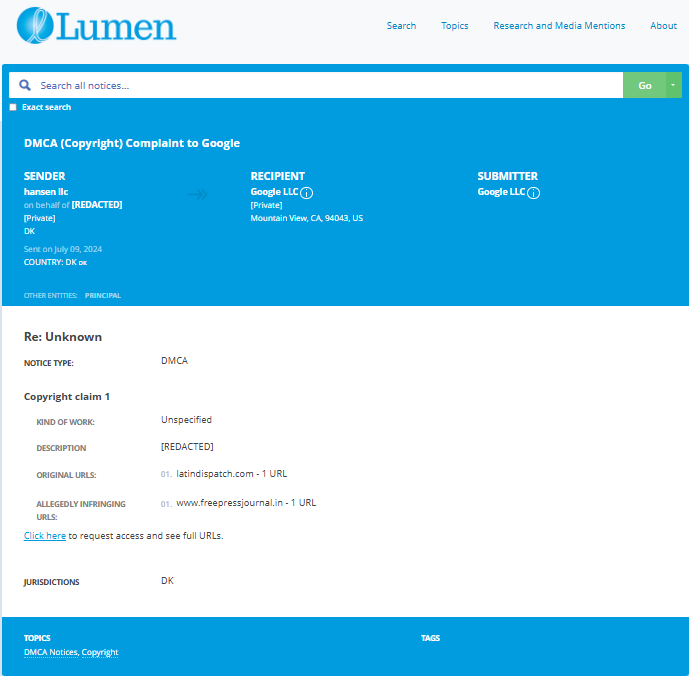
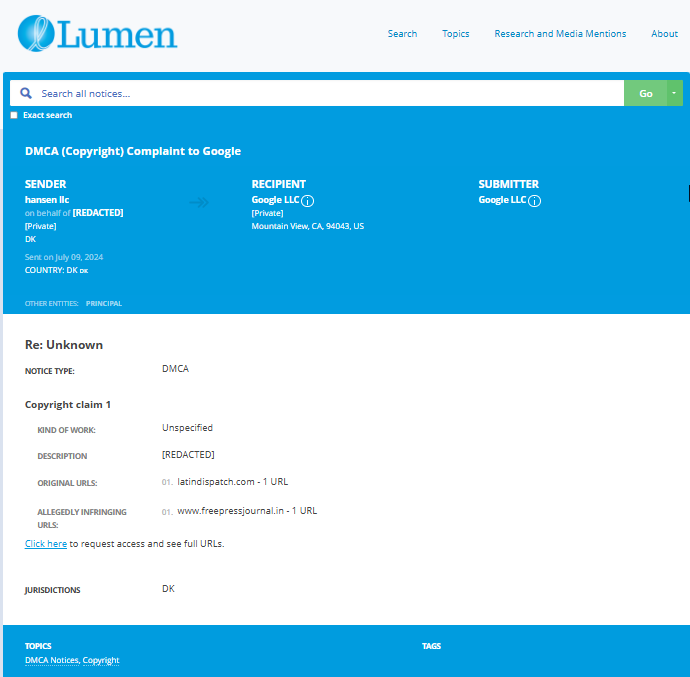
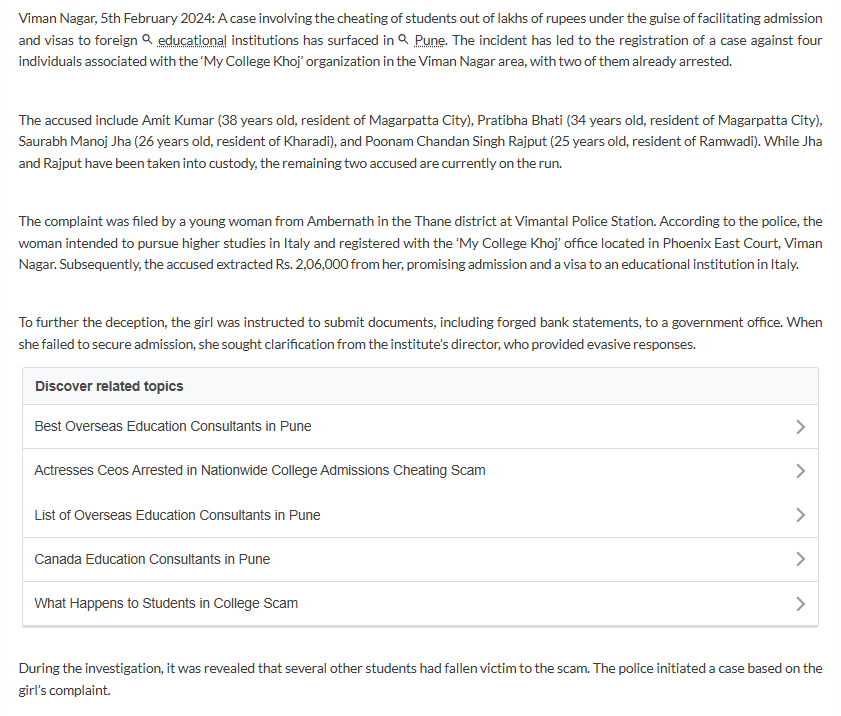
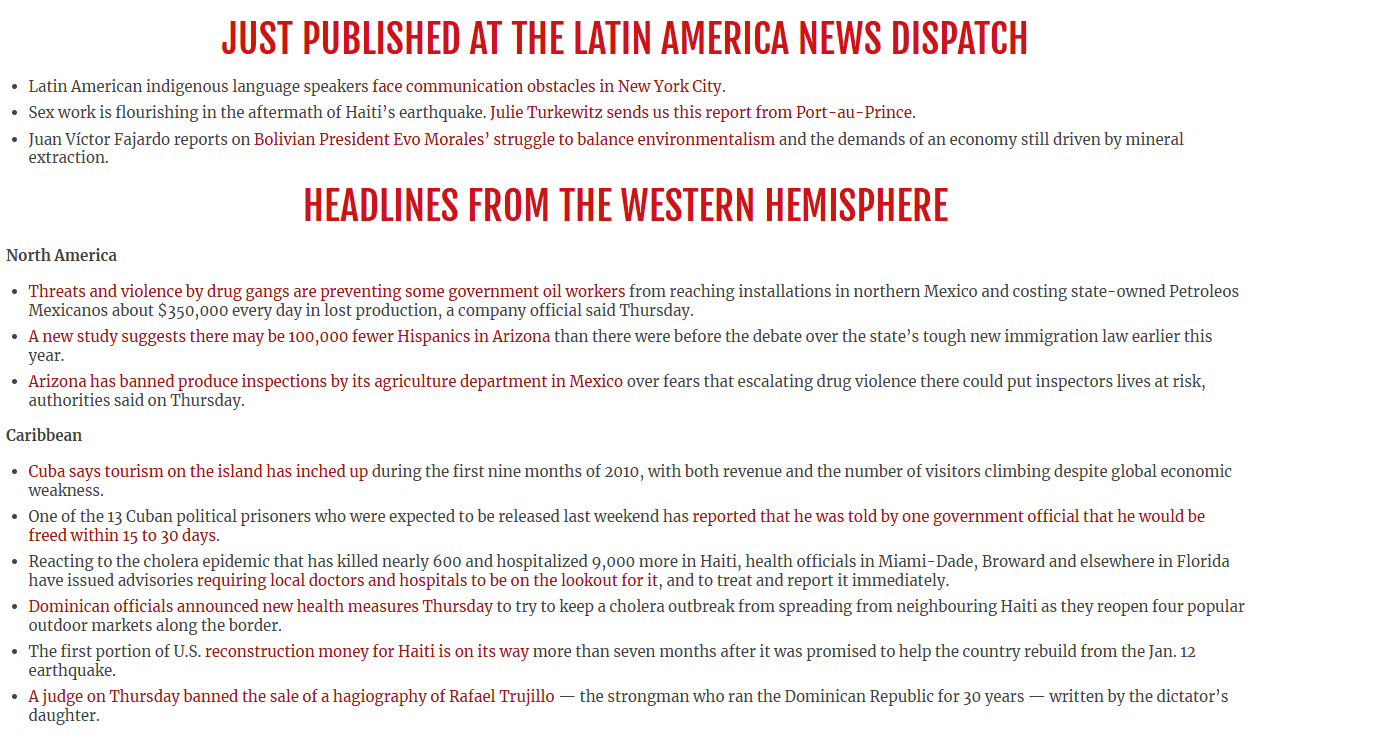


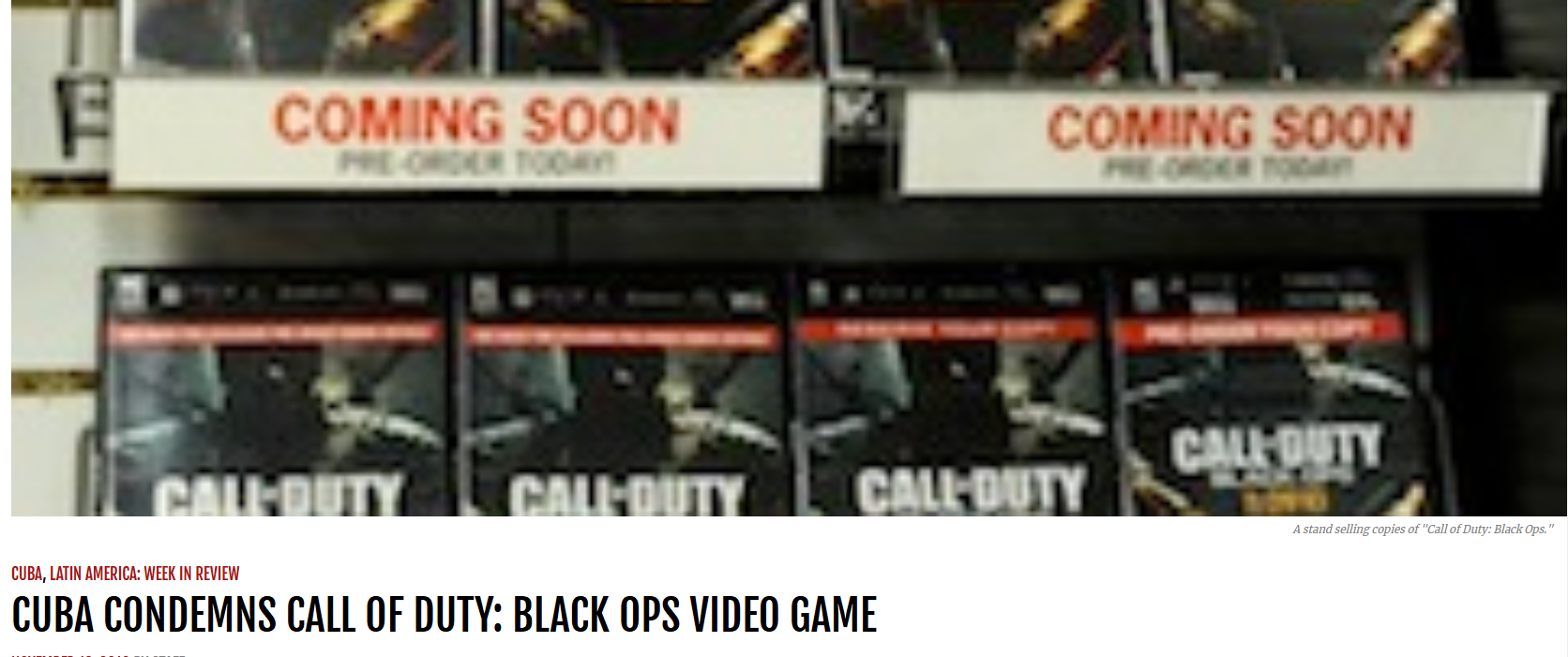
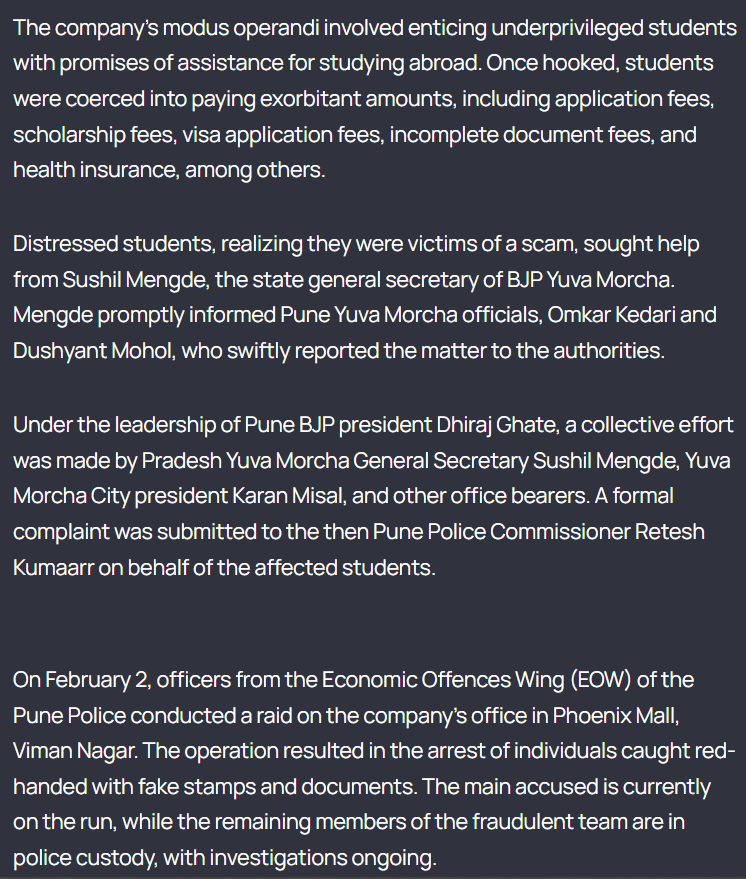

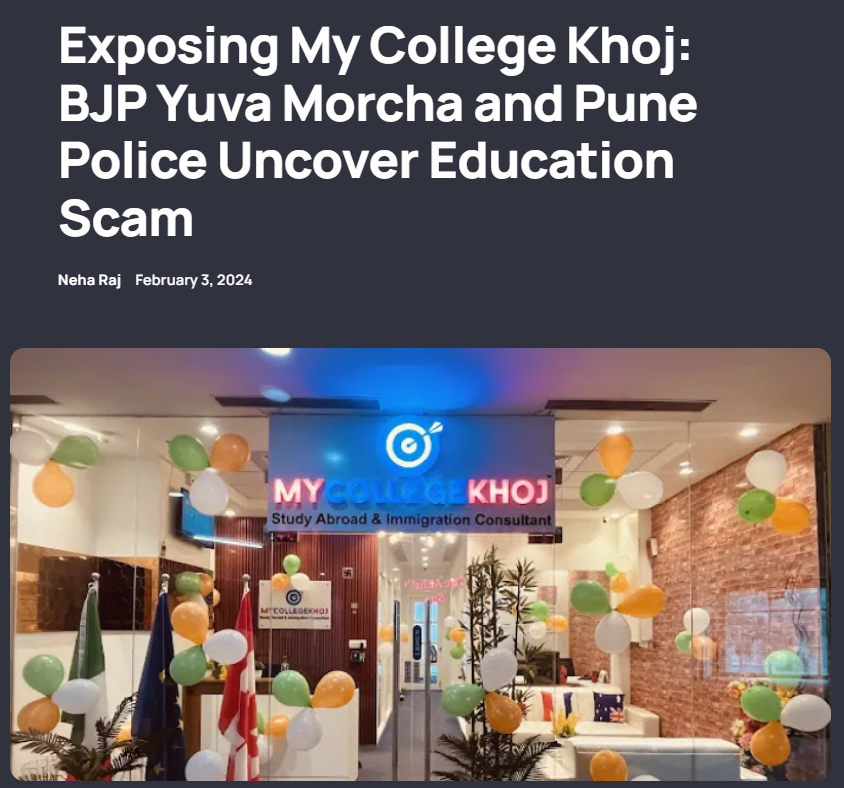
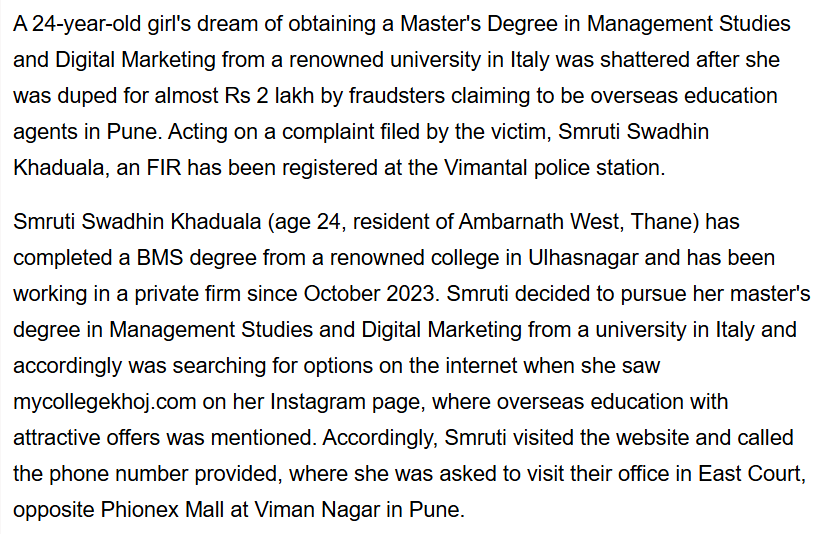

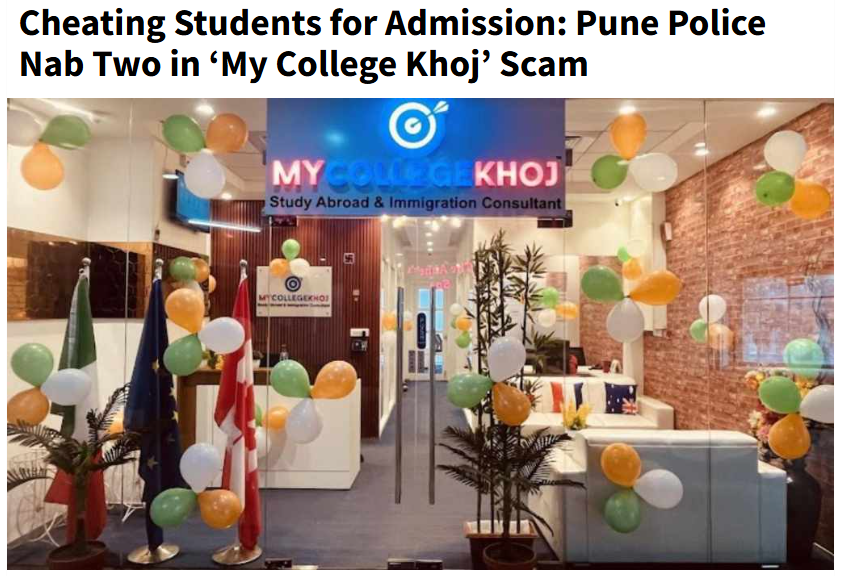

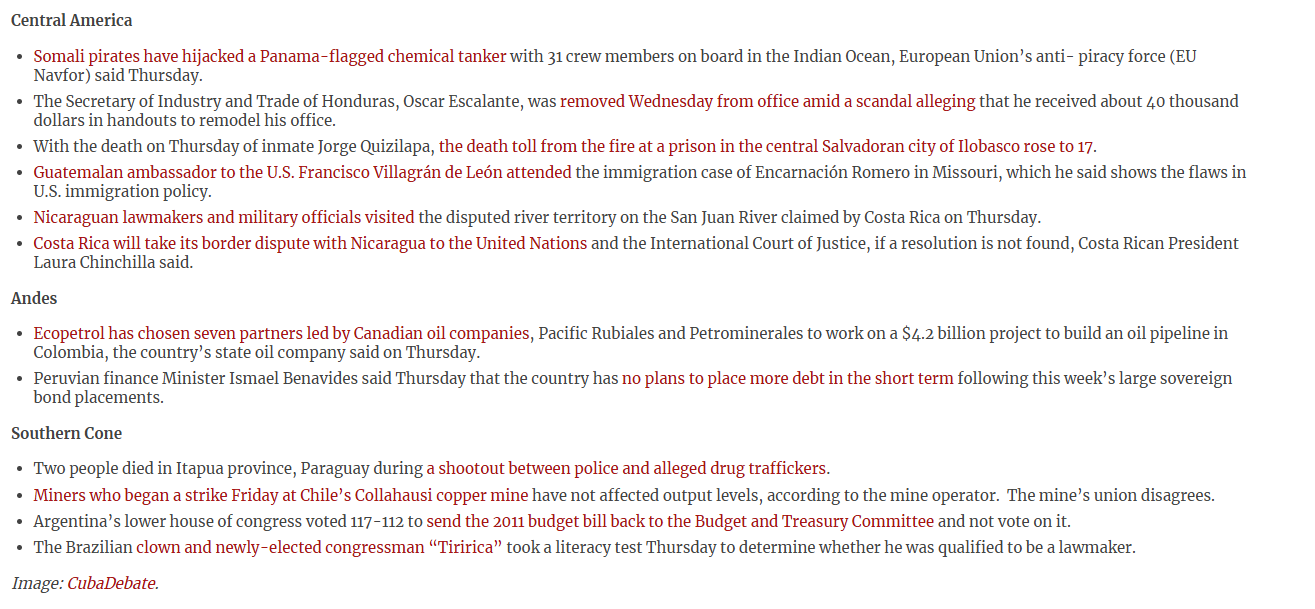
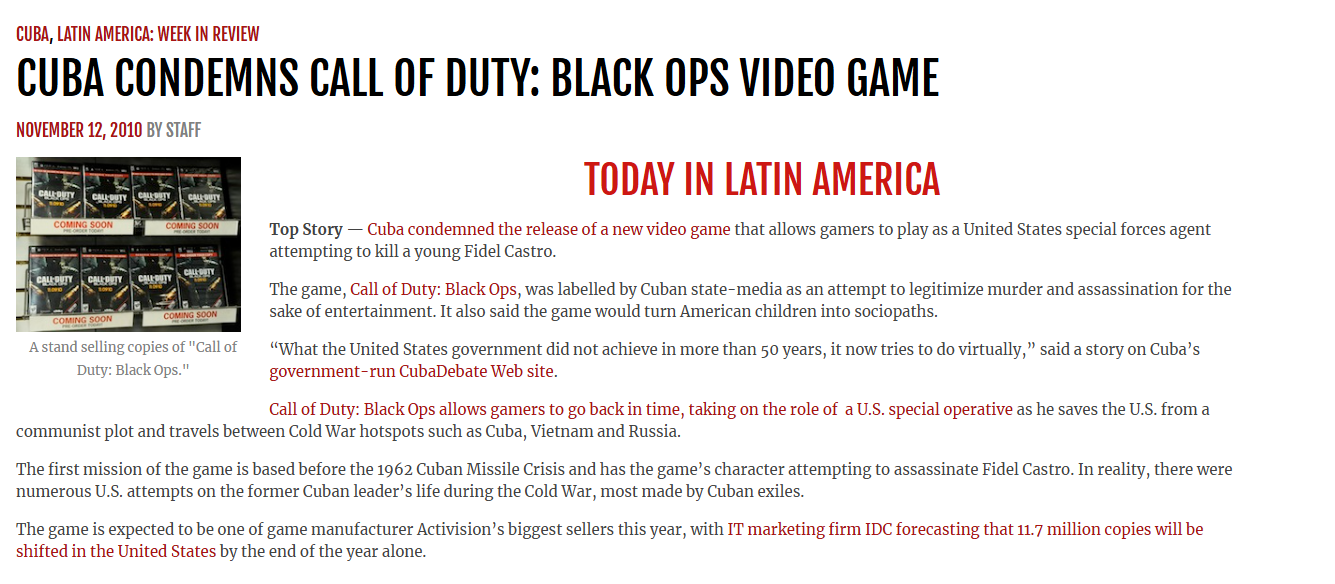


Targeted Content and Red Flags
punekarnews
Cheating Students for Admission: Pune Police Nab Two in 'My College Khoj' Scam
- Adverse News
lokmattimes
My College Khoj Scam: Pune Woman Duped of Rs 2 Lakh by Fake Overseas Education Agents; FIR Registered
- Adverse News
mypunepulse
Pune : BJP youth wing urges CP for immediate action against ‘My College Khoj’ for alleged fraud with students
- Adverse News

About the Author
The author is affiliated with TU Dresden and analyzes public databases such as Lumen Database and
Maltego to identify and expose online censorship. In his personal capacity, he and his
team have been actively investigating and reporting on organized crime related
to fraudulent copyright takedown schemes.
Additionally, his team provides
advisory services to major law firms and is frequently consulted on matters
pertaining to intellectual property law.
Escalate This Case


Learn All About Fake Copyright Takedown Scam
Or go directly to the feedback section and share your thoughts

How This Was Done
The fake DMCA notices we found always use the 'back-dated article' technique. With this technique, the wrongful notice sender (or copier) creates a copy of a 'true original' article and back-dates it, creating a 'fake original' article (a copy of the true original) that, at first glance, appears to have been published before the true original

What Happens Next?
Based on the feedback, information, and requests received from all relevant parties, our team will formally notify the affected party of the alleged infringement. Following a thorough review, we will submit a counter-notice to reinstate any link that has been removed by Google, in accordance with applicable legal provisions. Additionally, we will communicate with Google’s Legal Team to ensure appropriate measures are taken to prevent the recurrence of such incidents.


You are Never Alone in Your Fight.
Generate public support against the ones who wronged you!




Recent Investigations
Rayan Berangi
Investigation Ongoing
Zhang Yaoyuan
Investigation Ongoing
Roobet
Investigation Ongoing
User Reviews
Average Ratings
1.7
Based on 12 ratings
by: Colton Patterson
I can't believe this platform is using fake reviews to build its reputation.
by: Brooklyn Hughes
The lack of transparency in My College Khoj's operations, coupled with the aggressive marketing tactics and manipulated reviews, underscores the need for greater ethical standards in educational guidance services.
by: Caroline Long
The allegations against My College Khoj raise significant concerns regarding the platform's credibility, particularly in light of claims about misleading advertising and data privacy violations.
by: Livia Clark
I got an unsolicited call at 8 PM from them, offering services I never asked for. Super annoying and unprofessional.
by: Griffin Manning
My College Khoj is just another money-making machine. They promise a lot but deliver nothing. The fake reviews are a huge red flag.
by: Nadia Vaughn
I gave them all my personal details, and now I feel like I've been taken advantage of. Be careful, they might sell your data without you even knowing.
by: Bodhi Sosa
I signed up thinking it was genuine help but it turned into a spam nightmare.
by: Maeve Kerr
I wish I had checked reviews before signing up The fake ones fooled me.
by: Ryder Koch
Can't believe I trusted them with my info. Now I get nonstop spam from coaching centers
by: Grace Allen
This schame is a total scam.
by: Chloe Jackson
this schame is classic exmaple of scam
by: Julia Adams
This college has ruined so many lives with its fake promises. They sold a lie about overseas jobs, and now students are facing the harsh reality. They should not get away with this—there needs to be accountability.
by: Fiona Lee
My experience with Khoj was a complete nightmare. They promised career opportunities abroad but gave nothing but false hopes. They should be held accountable for this fraud.
by: Aaron Lopez
This place needs to be investigated! They took our money under false pretenses, offering fake job placements abroad. It’s a total scam!
by: Sophia Lane
Khoj College is nothing more than a scam! They promised international job placements, but it's all a fraud. I feel completely deceived.
Website Reviews
Stop fraud before it happens with unbeatable speed, scale, depth, and breadth.
Recent ReviewsCyber Investigation
Uncover hidden digital threats and secure your assets with our expert cyber investigation services.
Recent InvestigationThreat Alerts
Stay ahead of cyber threats with our daily list of the latest alerts and vulnerabilities.
Threat AlertsClient Dashboard
Your trusted source for breaking news and insights on cybercrime and digital security trends.
Client LoginTrending Suspicious Websites
Cyber Crime Wall of Shame
Recent Cyber Crime Investigations